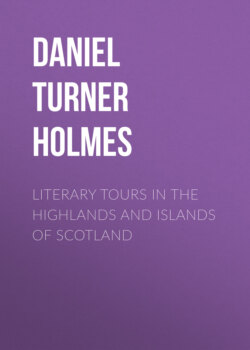Читать книгу Literary Tours in The Highlands and Islands of Scotland - Daniel Turner Holmes - Страница 19
На сайте Литреса книга снята с продажи.
RECENT BOOKS.
ОглавлениеTable of Contents
The most charming of recent works on the Outer Islands is that one of which the preface was written in Jerusalem. I refer to the volume of Miss Goodrich Frere, a lady whose vivacity, fervour, and picturesque style are deserving of unqualified praise. All the libraries in the bilingual districts contain the book, and few are so often asked for. In conversation and publicly I have often given myself the pleasure of recommending it, alike to Highlander and Lowlander. My admiration for Miss Frere's talents makes me wish that one or two of her prejudices had been less glaringly displayed. She speaks, for example, with something like scornful reproach of Lochmaddy, because the habit of taking afternoon tea is common in that township. It would have been more to the purpose if Miss Frere had issued a general warning to the people of the Hebrides not to drink tea as black as porter, and, above all, not to boil it. The pale anæmic faces one so often sees in the north and west, the mental prostration and actual insanity so alarmingly on the increase in the Long Island, are unquestionably due, in great measure, to the abominably strong tea that is swilled in such quantities there. A Tarbert doctor told me that the medical profession now talk quite familiarly of the Harris stomach just as drapers talk of Harris tweed: the former is, he averred, as weak and devoid of tone as the latter is strong and of good texture. This doctor was called up at two one morning to attend a patient in one of the moorland townships. At that hour, away over there on the gusty rim of the Atlantic, the natives were all afoot. People were talking to each other at the doorsteps; lamps were lighted inside, and tea that had been boiling for hours among the red peats, was being imbibed with infinite gusto. This, the doctor assured me, was the normal style of living.[5]
Talking of North Uist, Miss Frere shows indignation at the invasion of southern ideas, and thinks that everything is being vitiated by the taint of Lochmaddy. Lochmaddy, characterised in so droll a way, is a tiny township with a Sheriff Court, a church, a few well-built modern houses, a school, and an excellent hotel. Cleanliness is a welcome feature of the place, and I am sorry to say that the same can not be said of certain crofting villages not far distant. I expect that the visits of the Government Sanitary Officer, whom I met at Lochmaddy, and who knows his business well, will ultimately work an enormous amount of good. That gentleman gave me such unsavoury details regarding the conditions of life in certain of the townships as made me hope that the "taint of Lochmaddy," that is to say, the cleanliness and civilised life of that village, may more and more become evident throughout both the Uists. Improved sanitation would allow heaven's breath to circulate through the low-lying cots and prevent them from being hot-beds of malignant disease.
One feature of Miss Frere's book which does honour to her fine sympathy, but which is not ethnologically justifiable, is the persistent attempt to draw a sharp racial distinction between Highlander and Lowlander. The truth is, that no part of the Highlands is purely Celtic: the population is a welter of Picts, Gaels, Norsemen, Danes, and Saxons. The Lowland blood is, in like manner, a bewildering blend, there being no uncontaminated Anglo-Saxon district in any single county of Scotland. Mr. J. M. Robertson's clever book, The Saxon and the Celt, seems to me to dispose finally of certain fallacies that Hill Burton and others have light-heartedly written on the subject of racial characteristics. The conditions of life, the ungeniality of sea and soil, the wild and grand aspect of nature, influence thought, feeling, and character at least as much as blood and heredity.[6]
Another delightful book on the Outer Hebrides is that written by Mr. W. C. Mackenzie. Proceeding in the order of chronology, the author gives a vivid series of historic summaries (enlivened by many a piquant episode and humorous touch) of the Long Island from the earliest times. The wanderings of Prince Charlie, and the condition of the country after Culloden, have never been better told than in Mr. Mackenzie's narrative.
